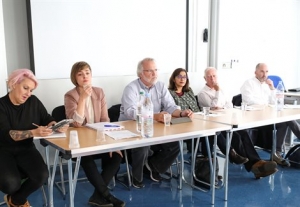By Zosia Sztykowski (@zosiaxyz) MSc candidate in the LSE Sociology Department
Source: Author's own photo
How do sociological insights explain why so many millions of Britons voted to leave the European Union on June 23? What could sociologists have done differently before the referendum, and why did the result take many of them by surprise? These questions, along with the one in the title of this post, were considered at an LSE Sociology Department workshop on Monday. Flowing through speakers’ responses was an argument that thoughtful, public-facing sociological work is needed more than ever in a context of social fissure which the referendum has highlighted.
All speakers agreed that castigating Leave voters as backwards is both inaccurate and insulting, and offered distinct ways to understand the Leave campaign’s success. Craig Calhoun, former Director of the LSE, spoke of the Leave vote as a response to legitimate, long-simmering frustrations over increasing economic insecurity and decreasing quality of life. These thoughts were echoed by Lisa McKenzie, a research fellow at the LSE, who illustrated with examples from her fieldwork that many Leave voters felt out of other options. William Outhwaite, Emeritus Professor of Sociology at Newcastle University, pointed to a history of British Euro-skepticism, while Will Davies, Co-Director of the Political Economy Research Centre at Goldsmiths, argued that the cultural elements of neoliberalism underpin the appeal of the Leave campaign’s anti-immigrant rhetoric. Under an ideology whose central organizing principle is competition, winners and losers are created; the former are understood to have earned their spoils, while the latter have themselves to blame for their failure. The relief of redirecting this blame away from oneself toward migrants is potent in ways that future research will hopefully help us understand.
This diversity of perspectives suggests that work on Brexit is rich terrain for sociologists. Yet the speakers also questioned the parameters on which we stake these post-Brexit analyses, asking, as Will Davies did, whether we would have been happy to continue ignoring the millions of Leave voters if the vote had been 52% for Remain. There was also a strong call for sociologists to think across methods and national boundaries. Speaking of the Leave vote as a vote about immigration, Gurminder Bhambra, Professor of Sociology at the University of Warwick, relativized the concept of Britain as a nation and the ideas of belonging and citizenship that attend it. She suggested that using the nation as a central unit in sociology reinforces assumptions about which groups are entitled to rights from the state as well as regard from sociologists.
What suffused each contribution was a sense of responsibility to provide accurate, timely insights into the social and how it coheres, or doesn’t. These insights can serve not only as warning signs for future political shifts of a seismic scale, but also as a basis for the public to make their decisions. As Lisa emphasized, many sociologists are already adding their knowledge to the public conversation, but more can be done to engage with non-academic audiences. The role of sociology was well-illustrated by Lucy Mayblin, Assistant Professor of Sociology at the University of Warwick, who described the lack of an evidentiary basis for asylum policy in the UK. Sociological knowledge is often flattened, if not ignored, in politics in favor of pat explanations; sociology must resist this flattening by remaining in conversation with its communities and giving dignity to the complexities of our world.






